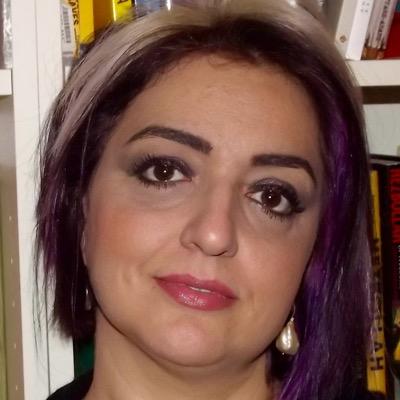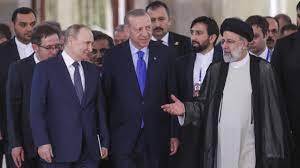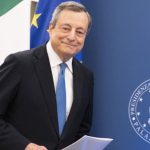On his second trip since the beginning of the invasion of Ukraine, Russian President Vladimir Putin traveled to Iran, where he met President Ebrahim Raisi and their Turkish counterpart Recep Tayyip Erdogan. In this meeting Putin seems to have gone there more to ask than to impose his own rules.
Ebrahim Raisi and Turkish leader Recep Tayyip Erdogan this time started from a position of strength.
The meeting took place a few days after the trip of the American president, Joe Biden, to the Middle East, with stops in Israel and Saudi Arabia, the two regional rivals of Iran.
So Putin pays a visit in search of eastern allies behind the fear of not being completely isolated, or in the hands of China alone. He admitted it yesterday, before leaving for the Ayatollah Khomeini airport in Tehran. “Russia cannot develop in isolation from the rest of the world,” he explained. “And we won’t.”
The “limitless” friendship signed by Putin and Chinese leader Xi Jinping in early February, three weeks before the invasion of Ukraine, does not seem to take off. Moscow risks falling under the orbit of Beijing in a relationship very different from a friendship between equals.
But the other two leaders are also looking to strengthen ties in the region. Raisi played at home. And he needs one thing above all: the priority of Iranian interests in the Middle East. In Syria and Iraq, in relations with Israel.
On the agenda, Ukrainian wheat still blocked in the Black Sea ports, oil and gas issues and peace in Syria.
The passage corridor for the grain
Vladimir Putin said progress has been made that could allow Russia to lift the blockade on Ukrainian wheat, an issue that threatens famine across Africa.
Since the beginning of the conflict, Turkiye has tried to mediate between Russia and Ukraine, hosting some rounds of negotiations. Ankara stands as an almost super partes interlocutor. Turkiye is a NATO member, but also one of Russia’s most important trading partners.
In the military field, the two countries are on opposite sides in Syria, Libya and Azerbaijan. Nonetheless, Turkiye is the only NATO member to have purchased the Russian S-400 missile system. But at the same time it sold the drones, to Ukraine. So in a complex panorama Erdogan becomes an interlocutor able to listen to both sides.
Regarding the issue of unblocking the grain on the Black Sea, Turkiye’s strategic position would allow monitoring the compliance of the possible agreement on the grain corridors that will cross the Black Sea. The UN proposal is to create a corridor that allows passage of Ukrainian wheat, which is in danger of rotting. And Turkiye, together with UN personnel, would inspect ships in transit, while the Kremlin would commit to a truce to allow safe passage of them.
Of the 106 million tons collected last year, Kiev managed to export just half. Mostly by land or by river, finding alternative routes to sea ports. At the moment, about 20 million tons lie in the silos of the Odessa port. For Ukraine, the naval blockade of the Black Sea puts the entire agricultural production chain in crisis. The effects would have repercussions not only on a national level, but also on a global level, worsening the crisis in many countries.
While there is no indication yet that the Ukraine grain corridor agreement will be signed this week, Putin nevertheless thanked Erdogan for his efforts.
Syria
Syria, after eleven years, remains one of the main geopolitical dossiers in the Middle East. While Moscow and Tehran support Bashar al-Assad’s regime, Turkiye is siding with the rebel militias fighting it. Furthermore, Ankara’s interest is to eliminate Kurdish militias in Northern Syria. But in order to do so, it will need the consent of the other two, given the weight that Moscow and Tehran have in Syria.
Yesterday, Erdogan, on the Kurdish question, reiterated that he will block the accession of Sweden and Finland “if they do not fulfill the conditions set by Turkiye”. That is, the handover of Kurdish activists who have found refuge in Scandinavian countries. And during the meeting he asked for the green light to “a special operation” in Northern Syria.
During the summit, Erdogan acknowledged that Iran and Russia understand Turkiye’s concerns, but said more than those words are needed. He said that Turkiye will continue its war against terrorist organizations in Syria and will not need anyone’s support and in any case expects Russia and Iran to “support Turkiye’s fight against terrorism“.
Putin is probably ready to make concessions on this. Even at the expense of Bashar al-Assad, who risks a new amputation of territories. Raisi perhaps less. Syria has been her backyard for too many years now.
The three Presidents pledged to fight terrorism together “in all forms”, but “rejected all attempts to create new realities on the ground under the pretext of fighting terrorism”.
Both Putin and Raisi said Syria would be better off without foreign intervention (they clearly addressed the US and Israel, even they didn’t name them). Both supported the Astana format as an effective way to reduce violence in Syria, especially in Idlib, and help with the refugee situation.
They condemned the continued military attacks on Syrian soil by Israel, which they recognized as a “violation of international law” and of Syria’s territorial integrity. And they rejected all unilateral sanctions, calling on the United Nations and others to provide assistance “without politicization”.
Gas and Oil
Oil follows at a price of $ 100 per barrel. Price necessary not only for Saudi accounts, but also for Russian ones. Oil serves Putin, to finance the war and to keep the Russian economy under siege from sanctions.
And China alone, which continues to buy Russian gas and oil at record rates and has given the green light to the Power of Siberia 2 pipe, with similar capacities to Nord Stream 2, is not enough. Now the priority is not to bring down the price of crude oil. And this is, among other things, the visit to the Islamic Republic.
There was a twist instead in the gas war. According to what was written by the Reuters agency, the flows through the North Stream 1 gas pipeline should restart on Thursday 21 July, thus respecting the scheduled maintenance schedule announced by Gazprom.
Astana
One of the decisions taken is that of the next round of Astana to be in Russia.
The idea of the three leaders was probably to enlarge the “Astana format”. Building an alternative global system to the US-led one.
Astana served to reconcile what seemed impossible in Syria, especially at the expense of the Americans. Now the energy and grain markets are at stake.
Ankara could act, and partly already does, as a clearing house. It imports gas and oil from Russia and Iran, openly and under the table, using it for itself and sorting it. The same could be done with cereals.
But are Ebrahim Raisi, Vladimir Putin and Recep Tayyip Erdogan really that compact? Could they really give birth to a lasting alliance system? Most likely not! To give life to such a system, momentary interests are not enough, not even the desire to remain in power, or to maintain the status quo in the international order. To be able to do this, you need common goals. And the three do not seem to have long term ones.
Tehran and Moscow are increasingly distant on oil and raw materials. The $ 100 a barrel of oil, for example, worries Iran, which sees its business in China and the rest of Asia threatened. If a new nuclear deal were to be reached, sanction-free Iran would put a lot of crude on the market, most likely leading to lower costs.
Moscow is looking to purchase hundreds of drones from Tehran for use in the war in Ukraine, according to the White House. Iran denies! Washington’s pressure on Tehran is high, the negotiators for the return to the JCPOA nuclear deal are at stake. So Iranian drones will eventually go to Russia and Russian weapons to Iran?
Putin has relations with US allies that Iran considers enemies, such as Israel and Saudi Arabia, or with which it has several open issues, such as the United Arab Emirates and Egypt.
On the other hand, Ankara and Tehran, too, are experiencing a tense phase of relations due to a diatribe concerning border waters, which have become increasingly indispensable in the midst of droughts, sandstorms and the food crisis. So, the meeting between the three took place, right! But it does not appear to have had the results that probably the leaders themselves expected.
Post Author
Author
-

Researcher on International Relations Middle East and Balkans
View all posts
CSSII- Centro Interdipartimentale di Studi Strategici, Internazionali e Imprenditoriali,
Università di Firenze, Italy, Albania




